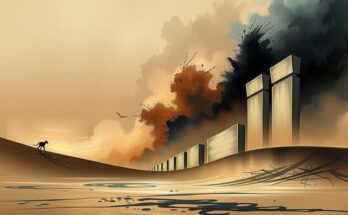Ahmad Baydoun, a Lebanese researcher, is using satellite imagery and geolocation data to document the environmental impact of Israeli military’s use of white phosphorus amid the ongoing conflict in Lebanon. His findings indicate severe public health risks and environmental degradation, with calls for international accountability as Lebanon faces massive displacement and destruction of farmland critical to its economy.
Ahmad Baydoun, a Lebanese researcher pursuing his PhD in Amsterdam, has redirected his academic focus to mapping the environmental consequences of alleged white phosphorus usage by Israeli forces in Lebanon. Following the escalation of conflict between Hezbollah and Israel that began on October 8, 2023, Baydoun’s work has gained urgency and relevance. His research combines satellite imagery, social media, and advanced geolocation techniques to document the devastating impacts of military actions on local populations and the environment. Utilizing visual data and real-time monitoring, Baydoun aims to hold accountable those responsible for military tactics that threaten public health and ecological balance. His findings highlight the severe health risks associated with white phosphorus, which can cause debilitating burns and respiratory problems. In addition, the environmental aftermath includes widespread contamination of soil and water sources, jeopardizing agricultural productivity crucial for Lebanon’s economy. The Lebanese National Council for Scientific Research has reported that since the conflict reignited, approximately 117 bombs containing phosphorus have been deployed in southern Lebanon. The Ministry of Environment reports significant destruction of forests and farmland, with 462 hectares affected. Baydoun emphasizes the broader implications of this devastation, stating that if these regions are not rehabilitated, the consequences could extend beyond Lebanon, affecting transboundary agriculture and markets. Moreover, the mental health repercussions of exposure to military actions, especially among children, further complicate the situation. Post-traumatic stress disorder, depression, and insomnia are increasingly prevalent among those affected. Baydoun’s interdisciplinary approach incorporates collaborations with local journalists to gather information from inaccessible areas, ensuring that documenting these crises continues despite institutional barriers. Despite Israel’s justification for its use of white phosphorus as a military tactic, significant evidence suggests potential violations of international law, raising alarms within human rights communities globally. The lack of decisive international action in response to these allegations further underscores the need for advocates like Baydoun who are committed to revealing the often-overlooked narratives of conflict. “I have had my share of sleepless nights. Emotions run high when attacks happen close to loved ones.” – Ahmad Baydoun. Baydoun’s research signifies a critical endeavor to document the ongoing humanitarian and environmental crises in Lebanon, providing a necessary account of suffering that must be acknowledged and addressed.
The utilization of white phosphorus in military conflicts is a contentious issue, governed by international laws that restrict its use, particularly in civilian areas. Although its deployment is legally permissible in certain contexts, the Convention on Certain Conventional Weapons and the Chemical Weapons Convention impose strict guidelines to protect civilian populations from its harmful effects. This topic gains importance amid ongoing tensions and hostilities in Lebanon, where accusations against Israeli forces regarding the use of incendiary weapons have raised significant concerns about public health, safety, and environmental stability.
In conclusion, Ahmad Baydoun’s research plays a pivotal role in highlighting the environmental and public health crises resulting from military actions in Lebanon. By employing innovative data visualization strategies, Baydoun aims to document and advocate against the harmful consequences of white phosphorus usage. His work not only serves as an essential record of the conflict’s impact on local communities but also calls for international accountability and intervention to protect civilian lives and the environment. The execution of such advocacy work becomes even more crucial in light of the urgent humanitarian needs arising from this ongoing crisis.
Original Source: www.arabnews.com




